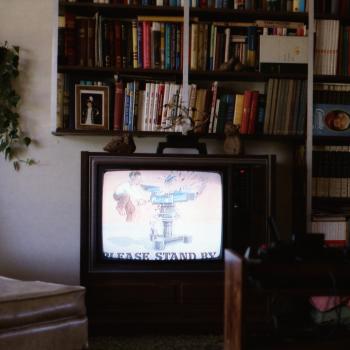 “Why does he make us feel the questions if he won’t give us the answers?” I don’t know that I’ve heard an existential cry as eloquent as that in all my born days, at least not one that sounded as though it might have risen from my own chest. It forms the theme of two films based in Judaism that sit high on my list of essential modern films.
“Why does he make us feel the questions if he won’t give us the answers?” I don’t know that I’ve heard an existential cry as eloquent as that in all my born days, at least not one that sounded as though it might have risen from my own chest. It forms the theme of two films based in Judaism that sit high on my list of essential modern films.
In 2009’s A Serious Man, one of Joel and Ethan Coen’s greatest films (which is saying something), Larry Gropnik (Michael Stuhlbarg) is a 1960s physics professor at a Midwestern university. Up for tenure, with a son about to undergo his bar mitzvah, he is met with at first a drop, then a stream, then a torrent, then a typhoon of ill fate.
That complication—Job in the throes—has been dramatized before, often and well; the Coen’s could have settled for their unique turn as well. Where they profoundly distinguish themselves is in the fastidious care and unflinching honesty they bring to a good man’s confrontation with God’s horrible quiet.
Lesser films might’ve focused on the rage, or on the apparent injustice. But the Coen’s portray the enigma: obedience and rectitude in the face of blows that change only from relentless to merciless. For all its rich humor, the film takes the toll of a hard shock. You’re left staring at a fissure that a lightning bolt has made, with the scarred earth still a-sizzle with sulphur.
Gropnik is a good but largely secular Jew, one who practices the conservative observance but never plumbs the faith’s questions. Like many a “religious” man, he’s managed by way of a certain behavioral code that’s more classical in nature than religious.
Rites of passage are celebrated under the roof of the holy house, but they’re mainly faute de mieux. And like many a religious man, Gropnik has never had to call upon his religion to answer anything. But as his woes mount, he is at first prodded towards, then actively seeks, help from the synagogue. Each time he goes, he meets with a different rabbi.
The first of the three is the youngest, a junior man who takes Gropnik into his office and ministers to him in the way that is all too representative of modern pastoral care. Palliatives are offered—advice given to see conflicts as opportunities. The second rabbi offers a teasing parable of acceptance. When questioned about its meaning, he is perplexed that he would be asked such a thing.
The third rabbi, Marshack, is a scholar of such caliber that no one is allowed to see him anymore. Deep in some mystical communion, Gropnik can only get a glimpse of the man in his study, though everyone insists he is the one with the answers. In a classic moment, it is Gropnik’s son, Danny, who gets an audience with the man, though the boy is fresh from a bar-mitzvah success despite, or because, of the fact that he was stoned solid on a fresh reefer.
None of these encounters give Gropnik the peace that he wants. It is his attempts to be “a serious man”—one who faces all and endures all—confronting the harsh reality of a world in which every choice is a bad one and none seem pure—that win our admiration.
In a final delimiting act, over-determined with reasons and counter-reasons, Gropnik is met with the fury of the whirlwind, simply for having made a choice. One gets the feeling that it would have happened even had he chosen otherwise.
What makes the man what he is—whether or not he ever sees this in himself—is the seriousness with which he asks the questions, the gravity with which he seeks the answers, and the significance with which he feels the meaningful silence all about him.
Last year’s Oscar-nominated work for Best Foreign Language film, Footnote, is no less profound in the depths it plums, though its focus is on the Gordian-knotted complexities of father-and-son struggles. Writer-Director Jacob Cedar portrays the relationship between a Talmudic scholar, Eliezear Sholnik (Shlomo Bar-Aba) and his more famous and celebrated son, Uriel (Leor Ashkenazi).
Eliezar, an old-school philologist, has one claim to fame—his research is a footnote to that of a rival scholar who beat him to publication. He is grim, under-appreciated and put-upon, but most of all, highly resentful of Uriel, whose popular approach to scholarship secures him much prestige.
A ceremony honoring his son’s election to the Academy of Sciences is pure torture; he cannot even bear to acknowledge himself as Uriel’s father when a security guard asks standard questions as to why he is attending the event.
All of this is handled with a familiar, comic flair up until Eliezar receives a call from the Minister of Education. Long passed over for the country’s most prestigious award given for scholarship, The Israel Prize, Eliezar is told that he’s finally to be one of the year’s recipients. The problem is that unbeknownst to him, the selection committee has made a mistake.
Through a mix-up, Eliezar was called instead of Uriel, the real recipient. When the prize committee, chaired by Eliezar’s bitter rival, tries to rectify the situation, Uriel refuses to take part. It will kill his father to have the honor taken away, then—all the worse—given to his son.
The chairman finally relents under two conditions: Uriel has to write the committee’s commendation to Eliezar, and he must disqualify himself from being considered for the Israel Prize in perpetuity.
As in A Serious Man, what follows is a riveting dramatization of what it means to make a choice, what it means to discover the pain that choices portend, what befalls a soul when every option can only end in loss, and above all—why in God’s name it has to be this way.











